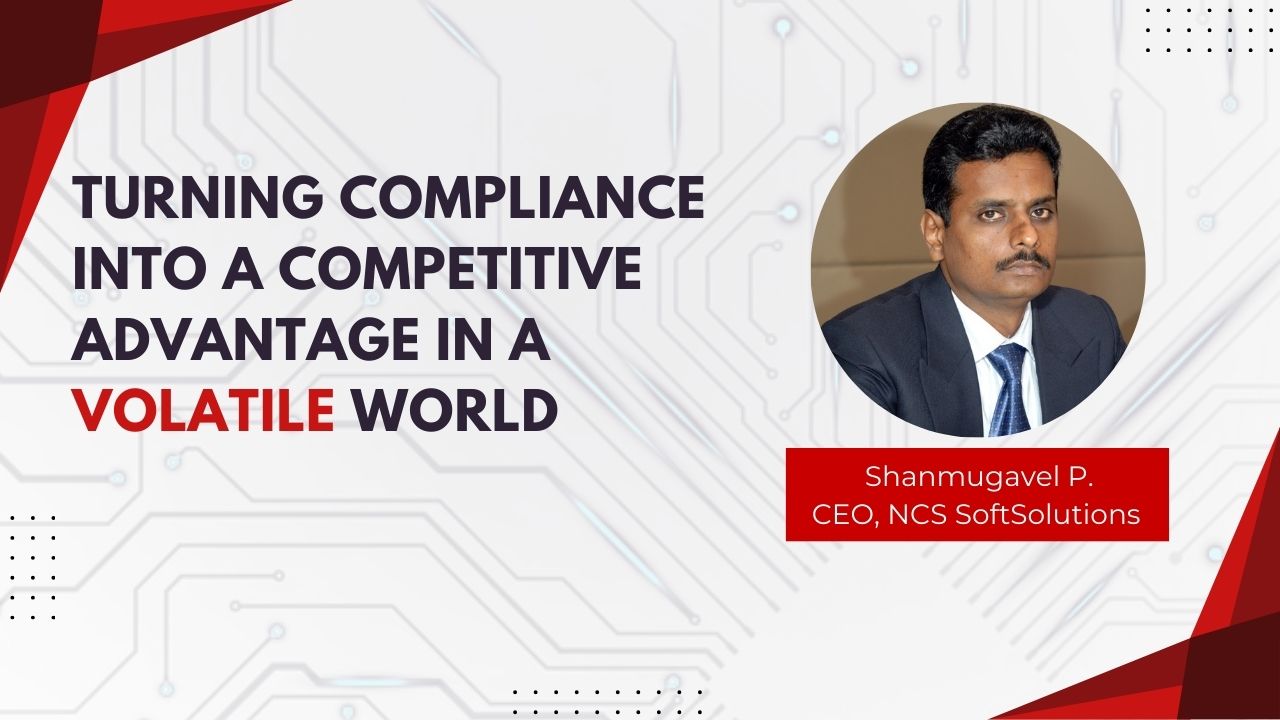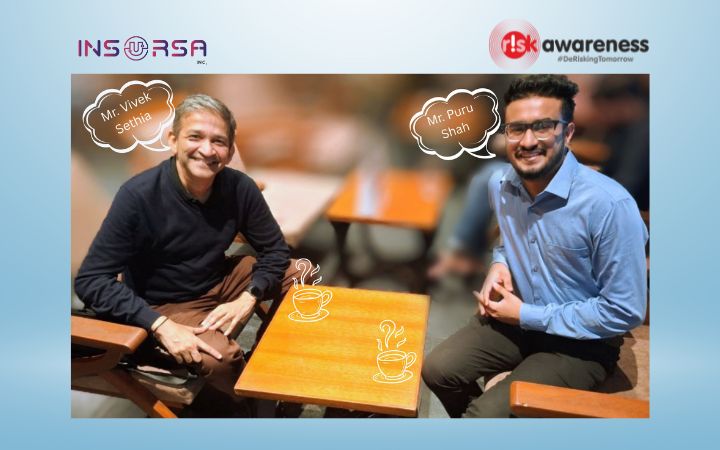In Conversation with Mr. Shanmugavel P., CEO of NCS SoftSolutions
As enterprises navigate increasingly complex risk environments, the demand for agile, scalable and technology-driven audit solutions has never been greater. For over two decades, NCS SoftSolutions has been at the forefront of enabling organizations to strengthen their risk and compliance frameworks. Its flagship product, eTHIC, has emerged as a leading risk-based internal audit platform trusted by enterprises across industries.
In this exclusive conversation with Puru Shah, Manager – Industry Outreach, RiskAwareness.in, Mr. Shanmugavel P., CEO, NCS SoftSolutions, shares insights on the evolution of risk-based internal audit, the adoption of AI-powered tools and the future of risk and compliance in a digitally transformed economy.
With two decades of experience, how have you ensured scalability and performance in risk-focused solutions for enterprise clients?
Mr. Shanmugavel P: At NCS SoftSolutions, we bring over 20 years of domain expertise in risk and compliance solutions and scalability has always been central to our flagship platform, eTHIC. Built on a modular, cloud-ready architecture, eTHIC is designed to grow with any enterprise, whether it’s a single-unit rollout or a multi-location deployment across thousands of users.
Seamless integration with existing enterprise systems ensures clients can adopt eTHIC without disrupting current operations. Performance is reinforced through continuous engineering improvements, rigorous load and stress testing and real-time optimization to handle high transaction volumes effortlessly.
Our track record with leading enterprises demonstrates that eTHIC consistently delivers speed, accuracy and compliance without compromise. This ability to combine scale with resilience is what sets our solution apart in today’s fast-evolving risk landscape.
How has risk-based internal audit (RBIA) evolved in recent years, and what key shifts are shaping current audit practices?
Internal audit has evolved from periodic, checklist-driven reviews to truly risk-based and continuous audit models. The increasing complexity of operations, coupled with digital transformation and large volumes of enterprise data, has made data-driven assurance essential.
Current audit practices are embracing advanced analytics, continuous monitoring and AI-assisted testing for real-time exception tracking and predictive risk detection. The focus has expanded to include third-party risk, operational resilience, cyber security, data quality and the development of technology-driven skills for auditors.
eTHIC is purpose-built for this shift. It embeds RBIA workflows, automated analytics, and continuous-monitoring capabilities, along with configurable controls aligned with global regulatory and industry standards. Through intuitive dashboards, eTHIC makes operational, vendor and cyber risks visible and actionable empowering management and auditors to act with clarity and speed.
What are the top challenges organizations face when implementing AI-powered audit tools, and how does eTHIC help overcome them?
Adopting AI-powered audit tools comes with challenges. Fragmented data across legacy systems can undermine accuracy, while organizational resistance may slow adoption. Additionally, regulations require transparent and explainable AI outputs, which adds complexity to implementation.
eTHIC addresses these challenges by integrating seamlessly with existing systems, using AI to automate most of the data cleansing and normalization, while flagging uncertain cases for human review to ensure accuracy and compliance and maintaining full transparency in its AI models. Configurable workflows and intuitive dashboards make adoption easier, while continuous-learning models deliver sharper, actionable insights over time.
In short, eTHIC enables organizations to harness AI confidently transforming audit efficiency and effectiveness without disrupting established processes or compliance requirements.
Which emerging risks, such as cyber threats, ESG or operational disruptions, are most critical today and how should audit frameworks adapt?
Organizations face a broadening spectrum of risks. Cybersecurity threats from ransomware to vulnerabilities in cloud environments remain high. ESG-related risks, such as sustainability disclosures, ethical compliance and reputational concerns, are gaining prominence. Operational disruptions and digital transformations, including fintech and technology-driven processes, introduce additional layers of third-party, data privacy and compliance risks.
Audit frameworks must move from periodic, transaction-focused reviews to continuous, risk-based monitoring. This includes embedding controls around technology resilience, vendor governance, ESG compliance and maintaining agility to meet evolving regulatory and industry standards.
eTHIC is designed for this landscape. It integrates configurable RBIA workflows, dedicated cyber and vendor risk assessment modules, ESG compliance checklists and real-time dashboards enabling proactive detection, assessment and mitigation of emerging risks while ensuring regulatory and management alignment.
Beyond traditional industries, which sectors is NCS SoftSolutions looking to expand into and what risk or compliance gaps do you aim to solve there?
While large enterprises remain our core strength, NCS SoftSolutions is expanding into sectors such as insurance, manufacturing, healthcare and large corporates industries where structured risk management and compliance are becoming critical. These sectors often struggle with fragmented compliance tracking, manual audit processes, weak vendor oversight and limited real-time visibility into operational risks.
eTHIC bridges these gaps with configurable audit and compliance frameworks, automated evidence collection, integrated risk registers and analytics-driven reporting. Organizations can shift from reactive, checklist-driven audits to proactive, risk-based governance enhancing accountability, transparency and compliance with industry or global standards.
Proven through multiple sector pilots, eTHIC demonstrates versatility and adaptability, delivering value wherever risk and compliance require rigor and innovation.
Which upcoming technologies do you believe will transform risk and audit processes over the next 3–5 years, and how is NCS preparing for this shift?
Over the next 3–5 years, AI-driven predictive analytics, NLP for unstructured data, blockchain for secure records and cloud-native platforms will transform audit and risk processes. Assurance will shift from periodic reviews to continuous, predictive monitoring.
At NCS SoftSolutions, eTHIC is already preparing for this future embedding AI for continuous risk monitoring, enhancing NLP for policy and contract reviews and exploring blockchain for secure audit trails. Optimized for hybrid and multi-cloud environments, eTHIC supports seamless integration and automation.
The future also emphasizes human-AI collaboration. Auditors and risk managers will evolve into tech-enabled strategists, combining domain expertise with digital tools to deliver faster, sharper and regulator-ready assurance.
eTHIC is designed to be industry-neutral, enabling enterprises across sectors to redefine risk and compliance as enablers of growth, trust and operational excellence.
RiskAwareness’ Perspective
As enterprises adapt to a future defined by digital disruption, regulatory intensity, and heightened stakeholder expectations, risk management can no longer remain a back-office function. It must be integrated into the very fabric of decision-making. NCS SoftSolutions, through its flagship platform eTHIC, is bridging this gap delivering scalable, AI-enabled and sector-agnostic solutions that transform audit and compliance from reactive checks into strategic assets.
With Shanmugavel P.’s vision and two decades of domain expertise, NCS SoftSolutions continues to demonstrate how Indian innovation can set global benchmarks in risk and compliance, empowering organizations to not just manage risks but to grow confidently in a volatile world.
Disclaimer: Views expressed in the article are the personal opinions of the author.








